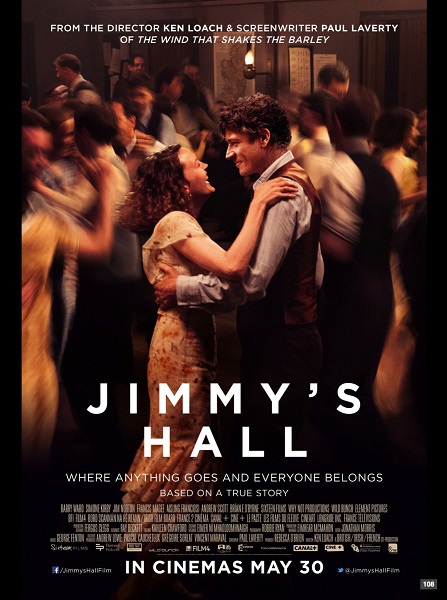
If forced to name my favourite working director, it would probably be Ken Loach who is possibly still most famous for Kes in 1969. Since the release of one of his masterpieces, Hidden Agenda in 1990, Loach has directed 16 feature films (excluding documentaries) and there isn’t a dud amongst them. His last, Angel’s Share, was my favourite film of 2012, so it’s no surprise that my expectations for Jimmy’s Hall were very high as it arrived here hot from Cannes.
Barry Ward stars as Jimmy Gralton who is forced to flee from Ireland to America in the 1920s because of his left wing political views. He returns to his home village a decade later, at a time when the Irish government and society were supposedly more tolerant. He repairs and re-opens the village hall to give the locals a place to meet, talk, sing, dance, and study. This immediately angered the church who believed that all education needed to be sanctioned by them and the local IRA leader, O’Keefe, who has a long standing grudge against Jimmy because of their differing political ideologies.
This is all typical Loach stuff, making a nice companion piece to the Wind That Shakes the Barley which was set in Ireland shortly before the events depicted in Jimmy’s Hall. It also reminded me of Loach’s Spanish civil war drama Land and Freedom during the scenes of political debate in the hall. There are some very good performances from Ward and familiar faces in the cast, such as Andrew Scott (Moriarty in Sherlock) as a sympathetic priest and Jim Norton (Bishop Brennan in Father Ted) as his strict superior. In many ways Norton’s character Father Sheridan is the most interesting as it was the most rounded and complex. Jimmy does however resist all temptations to kick him up the arse! The other performance that catches the eye is by Aisling Franciosi as O’Keefe’s spirited daughter Marie.
Some of the less experienced performers – unusually for a Loach film – come across as a little awkward. Other than Ward and Sheridan some of the characters are a little two-dimensional. Having said that, this is a very powerful story, with some of the financial and economic points made still relevant today, and it is a worthy addition to Loach’s CV. He did announce this would be his last feature film, though he has back tracked on that recently, so I am hopeful that there will be more to come from him yet.
Rating 8 out of 10